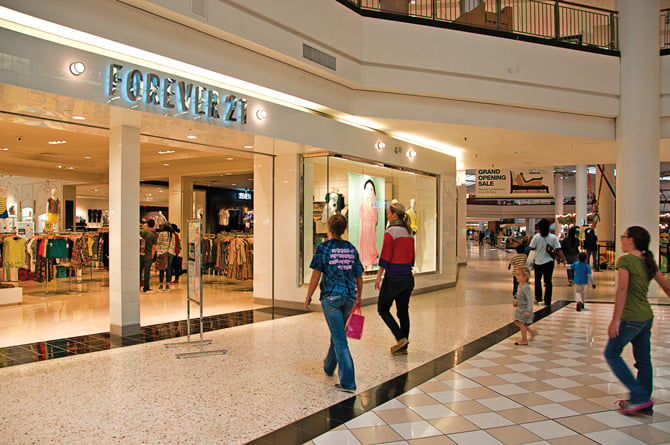
El Segundo-based Pacific Retail Capital Partners is taking on what could turn into its latest mall reinvention project – a major shopping center in Independence, Mo., that went into foreclosure after former owner Simon Property Group defaulted on a $200 million loan last year.
The 27-acre property with more than 1 million square feet of retail space has been struggling with declining occupancy and revenue in recent years, according to New York-based Trepp, a firm that tracks commercial mortgage-backed securities. Tenants faced new nearby competition and the effects of economic challenges in the Kansas City suburb, leading to a drop in net operating income for Indianapolis-based Simon before it defaulted on the loan, according to Trepp’s report.
Pacific Retail was named the new managing partner after the loan transferred to Torchlight Investors in New York, which manages distressed commercial real estate loans.
Najla Kayyem, senior vice president of marketing at Pacific Retail, said the company has not yet outlined a strategy for the enclosed 400,000-square-feet shopping center, which was built in 1974 and has more than 120 stores including Dick’s Sporting Goods and a Macy’s Inc. store.
Pacific Retail typically has an ownership stake in the properties it manages, but does not in this case, said Kayyem.
“We’re really just now getting our arms around the asset,” said Kayyem.
Matthew May, president of May Realty Advisors in Sherman Oaks, said that Pacific Retail would probably convert some of the retail space into another use depending on what was in demand in the area.
“What traditionally happens to old malls is they might tear part or all of it down,” said May. “They may build office, residential — that’s the most common right now — maybe medical, depending on what’s there. They’ve got to find a way to create a sense of place, a reason to go there.”
May added that Pacific Retail might also bring in some entertainment provider or a health club to draw in locals.
Fresh start
Independence Center Mall’s anchor tenants include Dillard’s, Sears along with Macy’s and Dicks Sporting Goods. Its other tenants consist of national chains as well as local independent retailers.
The mix hasn’t been immune to the challenges facing malls throughout the U.S., as e-commerce continues to pick up market share.
Occupancy declined to 83 percent in the first quarter of 2017, the lowest it’s been since 2008, after reaching 99 percent in 2010, according to Trepp’s report. Kayyem said Pacific Retail was looking to fill current vacancies, but declined to say what the current occupancy was.
Drops in revenue followed a similar pattern to the falling occupancy rates. The mall scored a post-Great Recession rebound of $24.6 million in 2012, but saw yearly revenue fall almost steadily from there to $22.2 million in 2016.
Declines in foot traffic at shopping centers has some mall owners trimming down their portfolios to only the most successful class A malls.
Westfield Corp., which was acquired by French commercial real estate firm Unibail-Rodamco for $16 billion in December, has been one such company which dramatically scaled down its portfolio.
But Pacific Retail, whose portfolio now includes nine enclosed malls and two outdoor lifestyle centers scattered across the country and is worth a total of $2 billion, has focused on class B malls with annual sales of $400 to $425 per square foot for non-anchor tenants.
Like many other mall operators, it has gotten rid of retail space in favor of more experiential concepts at some of its properties, like food halls and children’s play areas.
“Not all the malls are dying — that’s an exaggeration of what’s going on,” said May.
One nearby example of retail reborn into other product types is the former Macy’s Inc. store in North Hollywood’s once-busy Laurel Plaza Mall.
The store sold in 2014 and is being redeveloped into office space while surrounding property will become new retail, dining, entertainment and nearly 650 apartments. Dubbed NoHo West, the project is the work of San Diego developer Merlone Geier Partners and L.A. investor Goldstein Planting Investments Cos.
Pacific Retail is in the process of hiring an on-the-ground management team of about 10 people for the Missouri mall, a methodology it uses to help it determine the best use and gauge the temperature of the local market for each of its assets, Kayyem said.
The local commercial retail brokerage firm of Crossroads Retail Group will lead the leasing efforts.
“We feel it’s very important to have the communication and language of a project come out at a local level,” said Kayyem. “If you want to connect with the local community, you’ve got to have people on the ground.”
